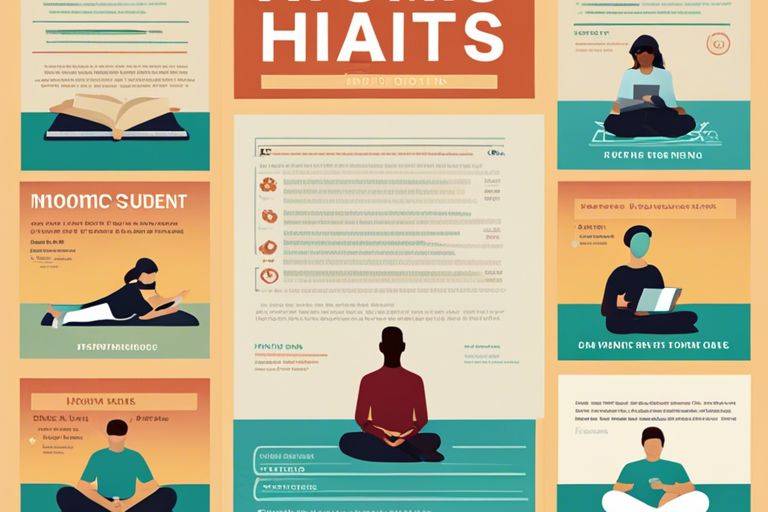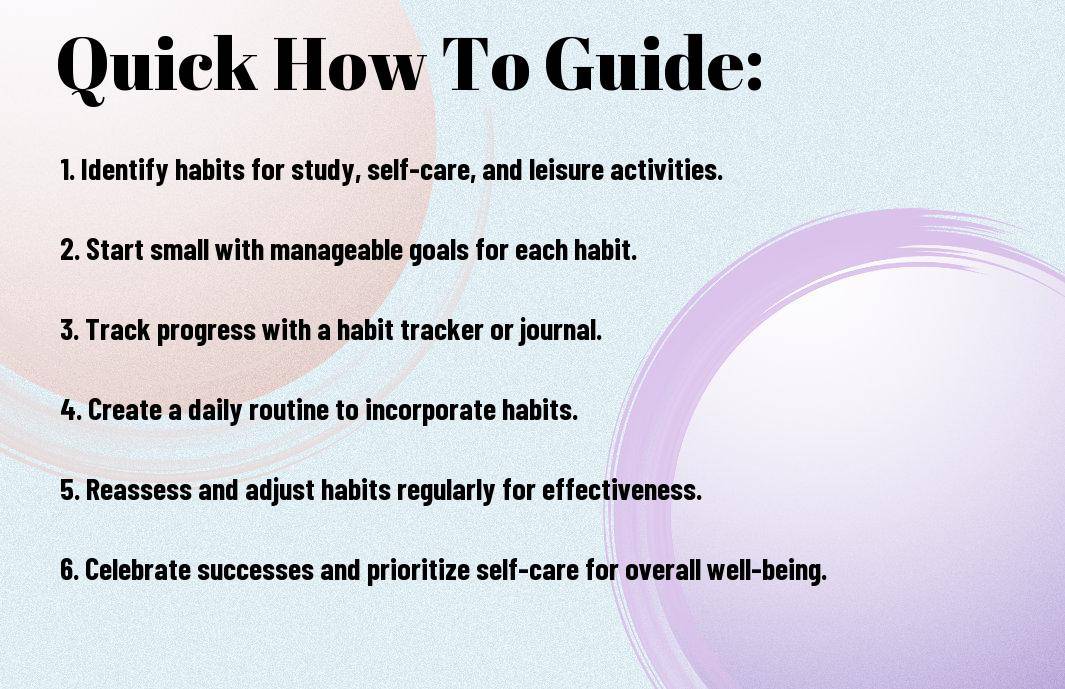
Newsletter Subscribe
Enter your email address below and subscribe to our newsletter

Enter your email address below and subscribe to our newsletter

This guide will introduce you to the power of Atomic Habits in helping you maintain a balanced student life. As a student, managing your time efficiently, staying organized, and avoiding procrastination are imperative components for success. By incorporating the principles of Atomic Habits into your daily routine, you can maximize your productivity and achieve a healthy work-life balance. For more tips on applying Atomic Habits to your study routine, check out How to Apply Atomic Habits to Studying to Get Better Grades.

Any student looking to maintain a balanced life needs to start by laying a strong foundation for success. This involves setting clear personal and academic goals, understanding the importance of habit formation, and working towards achieving harmony between various aspects of life.
While begining on your journey towards a balanced student life, it is crucial to define both personal and academic goals. Personal goals involve aspects like maintaining mental and physical well-being, fostering relationships, and pursuing hobbies. Academic goals, on the other hand, focus on achieving good grades, honing skills, and preparing for future career prospects. By clearly defining these goals, you can stay motivated and track your progress effectively.
Balance in student life heavily relies on the establishment of healthy habits. By developing routines that prioritize both academic tasks and personal well-being, students can create a harmonious lifestyle. Consistent habits such as time management, regular exercise, effective study routines, and adequate rest play a significant role in maintaining a balanced student life. Embracing these habits not only enhances productivity but also promotes overall well-being.
Sessions can be more fruitful when you use a time management tool to allocate dedicated time for studying. Create a study schedule that incorporates breaks and rewards to keep you motivated. Take advantage of active learning techniques such as summarizing information in your own words or teaching the material to someone else. Maintain a clutter-free study space to promote focus and concentration. This can be achieved by utilizing tools such as color-coded notes or using digital apps to organize your study materials more effectively. This way, you can stay on track and make the most of your study sessions!
This will ultimately lead to a more efficient study routine.
Maximize your study efficiency by creating an environment that promotes focus and minimizes distractions. Make use of noise-canceling headphones or calming music to drown out external noises. Remove any electronic devices that are not necessary for studying to prevent temptation. Set specific goals for each study session, and track your progress to stay motivated. By incorporating these strategies, you can create a conducive study environment that enhances your focus and minimizes distractions.
After focusing on maintaining a productive study routine and healthy lifestyle habits, it’s equally important for students to address their social sphere. Balancing relationships with academic responsibilities can be challenging, but it is necessary for overall well-being and success in school.
There’s no denying the importance of social interactions in a student’s life. However, it’s crucial to prioritize these commitments effectively. Start by identifying the most important relationships in your life, such as family, close friends, and mentors. Make sure to set aside dedicated time for these individuals, while also maintaining boundaries to prevent your academics from being compromised.
There’s a delicate balance between nurturing relationships and staying on top of your studies. One strategy is to plan social activities that align with your study schedule. Consider studying with friends or classmates to combine socializing with academic work. Additionally, make use of technology to stay connected with loved ones when you’re unable to meet in person.
Social interactions are key to personal growth and well-being, so don’t neglect them entirely. However, it’s important to find a balance that allows you to maintain strong relationships without sacrificing your study time.
Nurturing your relationships while managing your academic workload can lead to a more fulfilling student life. Remember to communicate your boundaries and priorities effectively so that both your social and academic spheres can thrive simultaneously.

Not only is it crucial to excel academically, but it is equally important to prioritize your health and wellness as a student. Maintaining a balanced student life involves taking care of your physical and mental well-being. By incorporating healthy habits into your routine, you can ensure you have the energy and focus needed to succeed in your studies and beyond.
If you’re looking to boost your physical health and overall well-being, consider integrating regular exercise into your daily schedule. Whether it’s going for a jog, attending a fitness class, or even taking a brisk walk around campus, finding ways to stay active can have numerous benefits for your body and mind. The key is to find activities that you enjoy and that fit seamlessly into your routine. The simple act of moving your body can increase your energy levels, reduce stress, and improve your concentration throughout the day.
Now, let’s talk about the importance of nutrition in maintaining a balanced student life. Eating healthy on a student budget may seem challenging, but with some strategic planning, it’s definitely achievable. Incorporating nutrient-rich foods like fruits, vegetables, whole grains, and lean proteins into your meals can provide you with the crucial vitamins and minerals your body needs to function optimally.
Incorporating a variety of food groups into your diet can help you stay full longer, maintain a healthy weight, and support your overall well-being. By planning your meals ahead of time, opting for homemade meals over fast food, and making smart choices at the grocery store, you can nourish your body without breaking the bank.
Importance of adequate sleep cannot be overstated when it comes to maintaining a balanced student life. Getting enough quality sleep is crucial for cognitive function, mood regulation, and overall health. By establishing a consistent sleep schedule, creating a relaxing bedtime routine, and optimizing your sleep environment, you can improve the quality of your rest and feel more refreshed each day.
To maintain a balanced student life, it’s crucial to prioritize your health and wellness. By incorporating exercise, healthy eating habits, and quality sleep into your routine, you can ensure that you have the physical and mental energy needed to excel in your academic endeavors. Note, taking care of yourself is a vital part of achieving success both as a student and in your future endeavors.
Many students struggle with balancing their academic responsibilities alongside their personal lives. Effective time management is key to maintaining a balanced student life. By mastering your schedule, you can ensure that you have enough time for studying, attending classes, completing assignments, and still have time for yourself.
Perceiving these factors and understanding how they affect your time management can help you make necessary adjustments to improve your study habits.
To create a study schedule that works for you, start by assessing your current commitments and responsibilities. Consider how much time you need to allocate for each subject or task to stay on top of your coursework. With a clear understanding of your priorities, you can create a realistic study schedule that allows for breaks and flexibility.
Influence your study schedule with tools such as planners, calendars, or study apps to help you stay organized and on track. Experiment with different study schedules to find what works best for you and don’t forget to incorporate time for self-care and relaxation to maintain a healthy balance in your student life.
For many students, managing stress and maintaining mental well-being can be a challenging task. Recognizing the factors that contribute to stress is the first step towards finding solutions. Any situation that triggers feelings of overwhelm, anxiety, or pressure can be considered a stressor. It could be academic deadlines, social pressures, or personal expectations.
To cope with stress effectively, it’s necessary to develop coping mechanisms that work best for you. This could include practicing mindfulness, engaging in physical activities, or seeking support from friends or professionals. By acknowledging your stressors and proactively addressing them, you can build resilience and better navigate the ups and downs of student life.
There’s no denying the importance of mental health in academic success and overall well-being. Another way to promote mental wellness is through mindfulness and relaxation techniques. By incorporating simple practices into your daily routine, you can help reduce stress levels and improve your overall mental clarity and focus.
Perceiving your mental health as a priority and dedicating time to nurture it can have a significant impact on your academic performance and overall well-being.
Now is the time to discuss the importance of continual improvement and adapting to change in maintaining a balanced student life. Life as a student is dynamic and ever-changing, which requires us to constantly reassess our habits and tweak them accordingly to keep up with our goals and priorities.
Some effective ways to track your progress and stay motivated include setting specific, achievable goals, keeping a journal to reflect on your daily habits, and using habit tracking apps to monitor your consistency. By visually seeing your progress and celebrating small wins along the way, you can stay motivated and committed to your journey of maintaining a balanced student life.
The key to long-term success in maintaining a balanced student life is the ability to adapt your habits as your circumstances change. The pressures and demands of student life are not static, so it’s crucial to regularly review your habits and make necessary adjustments. This might mean reevaluating your study schedule, incorporating new self-care practices, or seeking additional support when needed.
The flexibility to adjust your habits as your student life evolves is crucial for sustainable growth and well-being. Embrace the changes and challenges that come your way, and remember that small adjustments can lead to significant improvements in your overall student experience.
Hence, adopting the principles outlined in Atomic Habits can greatly assist students in achieving a balanced student life. By implementing small habits and focusing on continuous improvement, students can develop routines that enhance their academic performance and overall well-being. It is through these consistent actions and mindset shifts that students can create lasting changes that will help them succeed in their educational journey.
A: Maintaining a balanced student life is important because it helps in managing stress, improving focus, and achieving overall well-being.
A: Atomic habits are small, consistent actions that can lead to significant changes over time. By implementing positive atomic habits, students can create a routine that promotes balance in their lives.
A: Examples of atomic habits for students include setting daily goals, creating a study schedule, practicing time management, exercising regularly, and prioritizing self-care.
A: Students can stay motivated by tracking their progress, celebrating small wins, visualizing their goals, finding an accountability partner, and continuously reminding themselves of the benefits of maintaining atomic habits.
A: Students can overcome obstacles by practicing resilience, seeking support from friends or mentors, adjusting their strategies when needed, and staying committed to their goals.
A: The benefits of maintaining a balanced student life include increased productivity, improved academic performance, reduced stress levels, enhanced overall well-being, and a greater sense of fulfillment.
A: Students can create a daily routine by prioritizing tasks, allocating time for academic work, extracurricular activities, relaxation, and ensuring they get enough sleep each night.